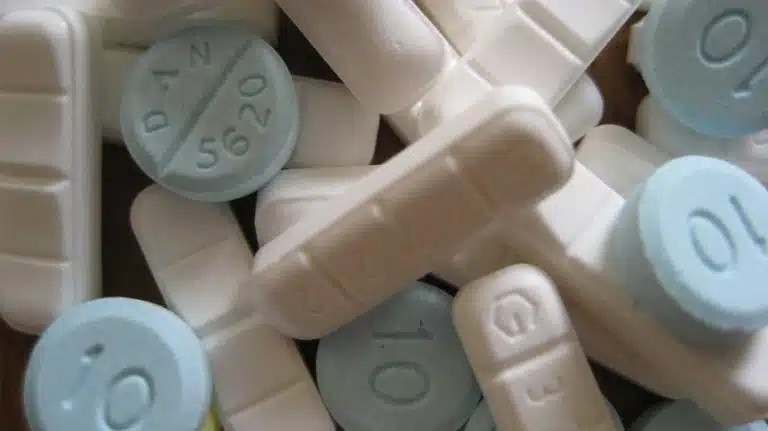Mixing Xanax & Adderall | Effects & Dangers

Xanax is the brand name of alprazolam, a benzodiazepine (or benzo) used to treat generalized anxiety disorder (GAD), panic disorder, and other anxiety disorders.
Adderall (dextroamphetamine and amphetamine) is a stimulant that treats those struggling with attention-deficit hyperactivity disorder (ADHD) and binge eating disorder. It can also be used to treat narcolepsy and other sleeping disorders.
Xanax and Adderall are prescription drugs that are also considered controlled substances. They should never be combined due to their addictive properties and potentially harmful effects.
Effects & Dangers Of Mixing Xanax & Adderall
Mixing Adderall with Xanax puts you at an increased risk of suffering serious health issues. For instance, taking both Xanax and Adderall can dangerously increase or decrease the effects of each substance.
Risky Drug Interactions
This means that the effects of these drugs can interact with one another, causing one of the medications to be less or more effective. With stimulant drugs such as Adderall, a person may be more active and become out of breath.
When this happens, this is a cause for concern as Xanax and other benzodiazepines such as Valium can lead to respiratory depression when taken in large quantities, with alcohol, or mixed with other benzos.
Mood & Behavior changes
The combination of Adderall and Xanax can also affect the brain and changes in mood and behavior. This may result in worsened mental health issues like anxiety, depression, and feelings of hopelessness.
Substance Use Disorder
You also run the risk of addiction when you combine Adderall and Xanax. Once addiction develops, both substances can cause serious withdrawal symptoms that may include:
- seizures
- tremors
- blood pressure fluctuations
- irritability
- rapid heart rate
- depression
- nightmares
- suicidal thoughts
- anxiety
Both Xanax and Adderall addiction can lead to an increased risk of severe side effects, especially when these medications are abused at the same time.
Xanax Addiction
Xanax is a depressant that targets the central nervous system (CNS).
Xanax abuse is a significant risk due to the addictive nature of the medication. Xanax is prescribed for only a short amount of time due to the high potential of prescription drug abuse from the medication.
When Xanax is combined with opioids, alcohol, or other benzodiazepines, serious respiratory depression may occur due to the multiple depressants one has taken.
Common Side Effects
Some of the common side effects of Xanax include:
- dizziness
- drowsiness
- impaired coordination
- fatigue
- lightheadedness
- difficulty concentrating
Serious Side Effects
More serious side effects from Xanax use are:
- increased heart rate
- shortness of breath
- passing out
- headaches
- memory impairment
- suicidal thoughts
Adderall Addiction
Adderall is a stimulant medication that raises the levels of dopamine and neurotransmitters in the brain. While this stimulant is helpful to those suffering from hyperactivity and even impulsivity, it can provide a sense of euphoria.
Adderall has been known to be heavily abused by college students and other young adults who try to study for a test the night before or desire to be more active. Adderall is also abused by those hoping to lose weight.
Common Side Effects
Some of the short-term effects of Adderall use are:
- diarrhea
- insomnia
- changes in sex drive
- upset stomach
- loss of appetite
- nervousness
- headache
Serious Side Effects
Those struggling with Adderall abuse may have long-term side effects including:
- increased heart rate
- shortness of breath
- panic attacks
- dizziness
- depression
- teeth grinding
- changes in vision
Substance Abuse Treatment
If you or a loved one are struggling with substance use, treatment programs can help. Addiction treatment plans likely include detox programs, behavioral therapy, support groups, and more. Services are available in both inpatient and outpatient treatment centers.
To learn about our treatment options, please contact us today.
Written by Ark Behavioral Health Editorial Team
©2024 Ark National Holdings, LLC. | All Rights Reserved.
This page does not provide medical advice.
National Alliance on Mental Illness - Alprazolam (Xanax)
National Alliance on Mental Illness - Amphetamine (Adderall)
National Library of Medicine: MedlinePlus - Alprazolam
National Library of Medicine: MedlinePlus - Dextroamphetamine and Amphetamine
National Library of Medicine: PubMed - A Review of Alprazolam Use, Misuse, and Withdrawal
National Library of Medicine: PubMed - An Exploration of the Relationship between the Use of Methamphetamine and Prescription Drugs

Questions About Treatment?
Ark Behavioral Health offers 100% confidential substance abuse assessment and treatment placement tailored to your individual needs. Achieve long-term recovery.
100% confidential. We respect your privacy.
Prefer Texting?
Our friendly support team is here to chat 24/7. Opt out any time.







 Learn More
Learn More








